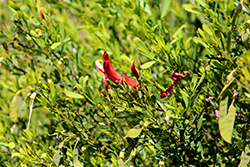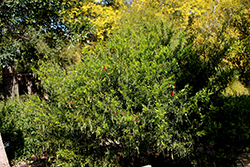It's all about ...
plants

Height: 6 feet
Spread: 6 feet
Sunlight:
![]()
![]()
Hardiness Zone: 9a
Other Names: Cockies Tongues, Cocky's Tongues
Description:
A dense, rounded evergreen shrub presenting rich red, pea-like flowers at the branch tips from winter into spring, over oblong gray-green leaves with blunt tips; flattened dark brown pea pods in late summer; tolerant of higher pH soils and salt spray
Ornamental Features
Coral Bush features showy clusters of red pea-like flowers with coral-pink overtones and white centers at the ends of the branches from mid winter to early spring. It has grayish green foliage with hints of powder blue which emerges light green in spring. The oval leaves remain grayish green throughout the winter. The fruits are showy light green pods which fade to dark brown over time, which are displayed from late summer to mid fall.
Landscape Attributes
Coral Bush is a dense multi-stemmed evergreen shrub with a more or less rounded form. Its average texture blends into the landscape, but can be balanced by one or two finer or coarser trees or shrubs for an effective composition.
This shrub will require occasional maintenance and upkeep, and should only be pruned after flowering to avoid removing any of the current season's flowers. It is a good choice for attracting bees, butterflies and hummingbirds to your yard. Gardeners should be aware of the following characteristic(s) that may warrant special consideration;
- Insects
Coral Bush is recommended for the following landscape applications;
- Mass Planting
- Hedges/Screening
- Rock/Alpine Gardens
- General Garden Use
Planting & Growing
Coral Bush will grow to be about 6 feet tall at maturity, with a spread of 6 feet. It has a low canopy, and is suitable for planting under power lines. It grows at a medium rate, and under ideal conditions can be expected to live for approximately 20 years.
This shrub does best in full sun to partial shade. It is very adaptable to both dry and moist growing conditions, but will not tolerate any standing water. It is considered to be drought-tolerant, and thus makes an ideal choice for xeriscaping or the moisture-conserving landscape. This plant will benefit from an application of bonemeal and/or mycorrhizal fertilizer at the time of planting. It is not particular as to soil type, but has a definite preference for alkaline soils, and is able to handle environmental salt. It is highly tolerant of urban pollution and will even thrive in inner city environments. This species is not originally from North America.
This plant is not reliably hardy in our region, and certain restrictions may apply; contact the store for more information.

